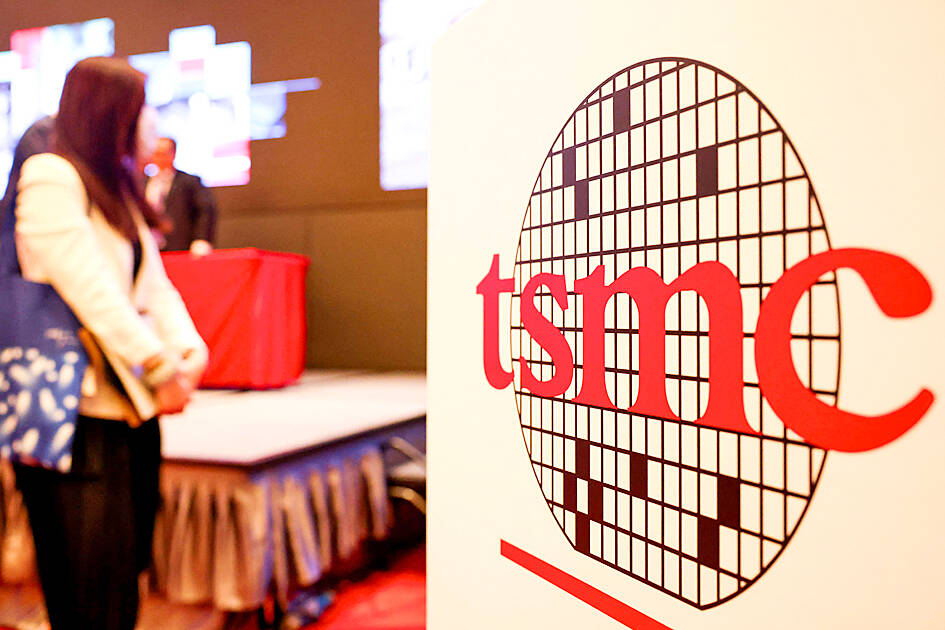The start of construction on the second wafer fab of Taiwan Semiconductor Manufacturing Co (TSMC, 台積電) in Kumamoto Prefecture, Japan, has been delayed due to traffic problems, TSMC chairman and chief executive officer C. C. Wei (魏哲家) said yesterday.
Wei’s comments confirmed recent reports that the second fab project has been postponed from the originally scheduled first quarter, when the chipmaker was to break ground on the plant.
Speaking with reporters on the sidelines of TSMC’s annual shareholders’ meeting in Hsinchu City, Wei said the presence of TSMC’s first facility has boosted traffic volume in Kumamoto, leading to complaints from local residents.

Photo: I-Hwa Cheng, AFP
“Many residents there have become impatient about the heavy traffic volume,” Wei said.
The sudden influx of workers from TSMC’s first fab is already bogging down rural infrastructure, he said.
“I have experienced that in person. For what used to take a 10-15 minute drive, it now takes almost an hour,” Wei said.
“TSMC is communicating with the Japanese government to improve the traffic conditions before the start of construction [of the second fab].”
Wei said the project will be delayed “a little bit,” but he did not disclose when construction is expected to start under the new schedule.
TSMC is also communicating with its clients, which are keen to see the capacity of the second fab come online, about the construction postponement, he said.
TSMC said in an e-mailed statement late yesterday that it is to start construction of the second fab within this year
In response to Wei’s comments, Japanese Chief Cabinet Secretary Yoshimasa Hayashi said at a regular news conference, “Heightened uncertainty in the global economy, along with challenges including the lack of domestic infrastructure and labor can lead to hesitation among private companies thinking of investing.” Tokyo recognizes the need to create an environment that attracts talent and investment from overseas, he said.
TSMC’s first fab in Kumamoto started mass production in late last year, using the mature 12 nanometer, 16nm and 28nm processes.
The second fab, which was originally scheduled to begin operations at the end of 2027, will use advanced 6nm and 7nm processes and the mature 40nm technology.
Additional reporting by Bloomberg

Taiwan Semiconductor Manufacturing Co (TSMC, 台積電) secured a record 70.2 percent share of the global foundry business in the second quarter, up from 67.6 percent the previous quarter, and continued widening its lead over second-placed Samsung Electronics Co, TrendForce Corp (集邦科技) said on Monday. TSMC posted US$30.24 billion in sales in the April-to-June period, up 18.5 percent from the previous quarter, driven by major smartphone customers entering their ramp-up cycle and robust demand for artificial intelligence chips, laptops and PCs, which boosted wafer shipments and average selling prices, TrendForce said in a report. Samsung’s sales also grew in the second quarter, up

On Tuesday, US President Donald Trump weighed in on a pressing national issue: The rebranding of a restaurant chain. Last week, Cracker Barrel, a Tennessee company whose nationwide locations lean heavily on a cozy, old-timey aesthetic — “rocking chairs on the porch, a warm fire in the hearth, peg games on the table” — announced it was updating its logo. Uncle Herschel, the man who once appeared next to the letters with a barrel, was gone. It sparked ire on the right, with Donald Trump Jr leading a charge against the rebranding: “WTF is wrong with Cracker Barrel?!” Later, Trump Sr weighed

HEADWINDS: Upfront investment is unavoidable in the merger, but cost savings would materialize over time, TS Financial Holding Co president Welch Lin said TS Financial Holding Co (台新新光金控) said it would take about two years before the benefits of its merger with Shin Kong Financial Holding Co (新光金控) become evident, as the group prioritizes the consolidation of its major subsidiaries. “The group’s priority is to complete the consolidation of different subsidiaries,” Welch Lin (林維俊), president of the nation’s fourth-largest financial conglomerate by assets, told reporters during its first earnings briefing since the merger took effect on July 24. The asset management units are scheduled to merge in November, followed by life insurance in January next year and securities operations in April, Lin said. Banking integration,

LOOPHOLES: The move is to end a break that was aiding foreign producers without any similar benefit for US manufacturers, the US Department of Commerce said US President Donald Trump’s administration would make it harder for Samsung Electronics Co and SK Hynix Inc to ship critical equipment to their chipmaking operations in China, dealing a potential blow to the companies’ production in the world’s largest semiconductor market. The US Department of Commerce in a notice published on Friday said that it was revoking waivers for Samsung and SK Hynix to use US technologies in their Chinese operations. The companies had been operating in China under regulations that allow them to import chipmaking equipment without applying for a new license each time. The move would revise what is known